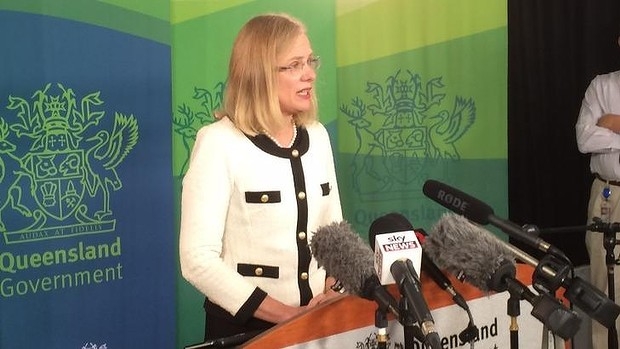
Negative result after patient at Royal Brisbane and Women’s Hospital tested for Ebola
AN 18-year-old woman quarantined in the Royal Brisbane and Women’s Hospital with a fever has tested negative for Ebola.
Queensland Chief Health Officer Dr Jeannette Young announced the negative results this morning.
It is understood the woman will now undertake a second round of testing.
Queensland Health will hold a press conference in Brisbane at 8am.
The 18-year-old is being kept in an isolation ward at the Royal Brisbane and Women’s Hospital after developing a fever yesterday.
She arrived in Australia 12 days ago from Conakry in Guinea, with eight members of her extended family, including six children.
A total of nineteen people are being isolated in home quarantine in Brisbane as a precaution against spreading the Ebola virus, as a teenage woman undergoes tests for the deadly disease in hospital.
Earlier:
A patient with a fever who recently traveled in West Africa has been isolated at the Royal Brisbane and Women’s Hospital.
The 18-year-old West African woman came to Brisbane 11 days ago and had no known contact with people who were infected with the virus, according to Queensland’s chief health officer Jeannette Young.
The woman was not a health care worker and had come to Brisbane with her family after flying from Guinea.
She has undergone initial testing for the Ebola virus, and will have a second test for the presence of the virus in three days time.
Dr Young said the woman was moving to Australia with her family.
The woman developed the fever last night and was transfered to the RBWH by ambulance.
Dr Young said the ambulance officers who assisted the woman had worn full protective clothing.
She said there were six children and two other adults in the woman’s family.
“They’re all perfectly well and no-one else in that family has a fever,” Dr Young said.
She said the family had been in home isolation since arriving in Brisbane.
“There is no risk to the community at all because they haven’t left the house …. in the time that they have been here,” Dr Young said.
“I’m very confident that there is no risk to any member of the Queensland community.”
She said the remaining family members were being closely monitored, however they were not expected to be at risk as Ebola is thought to be contagious only when symptoms are evident.
Dr Young said the women’s fever had abated, however that did not mean she was in the clear and testing would take place over the next three days to determine whether she had the Ebola virus.
She said the family’s actions in minimising the potential for spreading the virus had been “highly responsible”, ensuring that the risk of the disease spreading was low even if the woman tested positive for the Ebola virus.
Dr Young said the “risk of getting the Ebola virus disease in Australia is extraordinarily low”.
“You do need direct contact with the secretions of someone who is sick (to catch the Ebola virus),” she said.
Earlier this month an Australian nurse who had been treating Ebola patients was isolated with a fever in Cairns.
Australian Red Cross aid worker Sue Ellen Kovack was admitted to a Cairns hospital after coming down with a low-grade fever soon after returning from treating victims in Sierra Leone.
The 57-year-old twice tested negative for the virus before she was released from hospital on October 13 to complete the 21-day incubation period for Ebola at home.
The latest Brisbane scare comes as an Australian man living in Thailand is under Ebola watch.
The man had recorded an elevated temperature and was been told to stay at his home in Thailand after returning from the Democratic Republic of Congo, where 49 people have died of Ebola.
The unnamed man returned to Thailand on October 17 from the DRC, where he works in the oil-drilling industry.
He lives in Trat province, 312km southeast of Bangkok.
Reports said Trat Hospital had been asked by the Thai public health office to prepare “to put a patient under investigation”, after he recorded an elevated temperature when he was tested at Bangkok international airport.
A doctor at Trat Hospital’s emergency unit said the man had been told to “remain at home” under observation, until November 5, three weeks after returning from Africa.
“He doesn’t come to the hospital, he just stays at home,” the doctor told AAP.
The order is in line with the mandatory 21-day quarantine for medics returning to the US who may have had contact with Ebola patients in west Africa.
The Ebola outbreak in the DRC, reported by the US Center for Disease Control and Prevention (CDC), is unrelated to the outbreak in west Africa, where nearly 10,000 people have been infected and almost 5000 have died from the virus.
In DR Congo, the CDC has reported 67 cases of Ebola and 49 deaths.
The concerns over the Australian comes as Thai medical authorities are set to reveal the results of blood tests on a British man, 68, who was found dead in his apartment in Phuket on October 23.
The man, who had travelled from Lagos in Nigeria on October 7, went to a local hospital on October 15 after fainting. Doctors treated him for a heart condition and sent him home.
The Thai Health Department is monitoring about 25 people who had been in contact with the man.
Research scientists at Thailand’s Mahidol University announced recently they were successful in developing an antibody treatment for Ebola using human gene therapy.
The Thai researchers are receiving assistance from the World Health Organisation and the US National Institute of Health to continue their research.
Thailand is closely monitoring visitors from Ebola-affected states, with more than 2400 people screened without detecting any cases.
